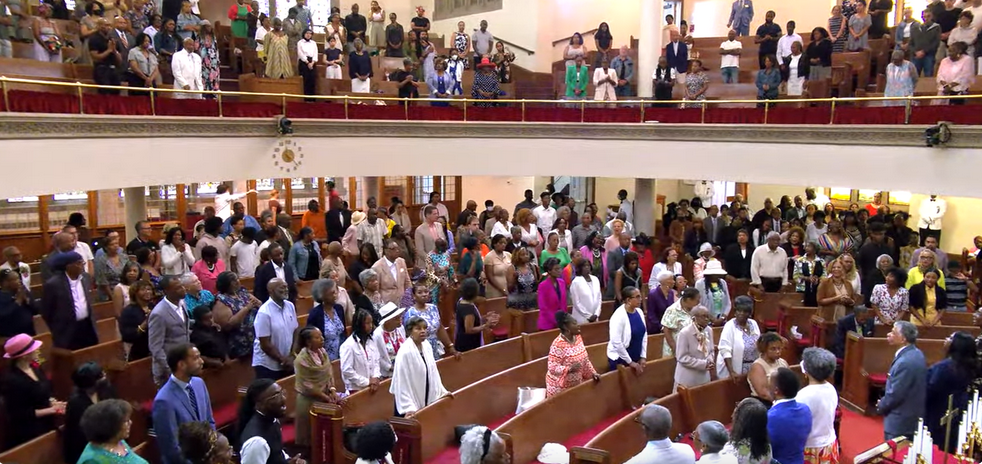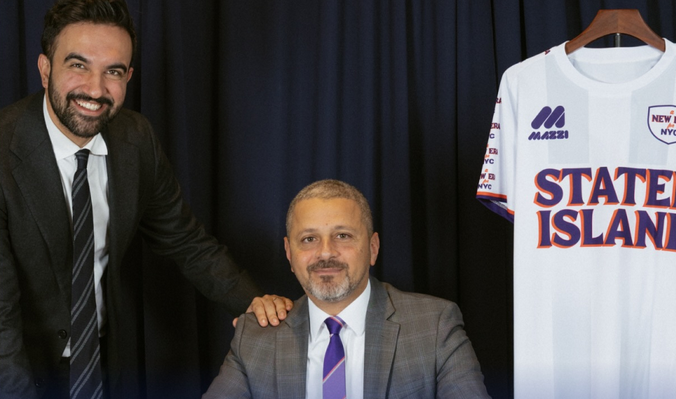[Racial Policing News]
CPR’s Anthonine Pierre: “De Blasio has a lot of things to say about racial justice, when it comes to policing. The question to your readers is: what have they seen happen in the last five years as we have been waiting for justice on this particular [Eric Garner]case?”
Photo: Facebook
Communities United for Police Reform (CPR) is a collective of local groups who are fighting to change racial policing in New York.
In recent years, CPR has been an important voice advocating for important new laws to increase police transparency and accountability. CPR has supported the victims and families of police violence—like Eric Garner.
Recently, the Black Star News spoke to Anthonine Pierre, Deputy Director of Brooklyn Movement Center, one of the community groups that makes up the CPR collective.
The Black Star News first asked Pierre about CPR’s mission and work.
“The work of CPR is really to work with groups all around the city who have a clear interest in changing the relationship between police and communities,” said Pierre. And, specifically, doing work that is led by people who are most deeply impacted by police abuses, so that, we often will think of Black people but also more broadly will included young people, queer folks, immigrants, Muslims, like all the different categories of folks who face police abuse.”
Black Star News next questioned her about the “Safer New York Act.”
“The Safer New York Act is a set of bills, in the State Legislature, that are meant to improve the lives of the folks that are directly affected by abusive policing throughout the state,” said Pierre. “There are a few bills. At the top of the line, there is 50a (A2513-O’Donnell/S3695-Bailey) which is a bill to end police secrecy laws. New York is one of two states in the country, the other being Delaware, that has a law that shields police disciplinary records from the public. And that’s why we reference it as a police secrecy law.
“So 50a, then there is the special prosecutor bill (A1601-Perry/S2574-Bailey), which folks who follow policing, will be familiar with the fact that, in 2015, [Governor] Cuomo signed an executive order making it so that folks who are killed by police receive a special prosecutor, the police are prosecuted outside of the district attorney’s office to increase transparency. That was an executive order. We’re looking to codify that bill.
“There is a police STAT Act, which is basically a data reporting bill, we’re just asking for police departments, around the state, to report data on racial disparities in policing. So, racial disparities in stops, racial disparities in civilians being killed by police.
“And the final bill, is an unnecessary arrest bill (A4053-Aubry/S2571-Bailey). So it’s a bill that would end, in instances where police have discretion to either give a ticket, or, arrest it would take away the option of arrest and would just make those offences ticket-able offences. Which, they are usually quote-on-quote quality-of-life offences like jumping the turnstile, public drinking, all of these ways that communities are over-criminalized by policing.”
CPR’s support for the “Right to Know Act” was the next topic Ms. Pierre addressed.
“The Right to Know Act was passed by the New York City Council in December 2017, It, was signed by the Mayor in early 2018,” said Pierre. “Right to Know has two big parts. So, one is the consent to search bill. Consent and search requiring that if an officer stops someone and they don’t have reasonable suspicion to search them, then they have to give the person a piece of paper telling them why they were stopped.
“The other bill is the I.D. bill, which would require that when an officer stops someone, and they don’t arrest them, or give them a ticket, then they would have to give them a business card. Both bills are aimed at transparency, when it comes to police stops, and really serves to change the relationship of power, where police officers feel like they can stop anyone, search anyone, and really adhere to the importance of having probable cause to stop someone, and having reasonable suspicion to search someone.”
The Black Star News then asked about the Community Safety Act.
“So, the Community Safety Act was passed by the New York City Council back in 2013, and was actually vetoed by Mayor Bloomberg, in 2013, and was passed again with a veto-override vote by the City Council,” said Pierre. “It consists of two bills. One is a discrimination bill that expands the classes of discrimination on which civilians can seek legal recourse it expands the protected classes from race and gender to religious identity, and housing status, and a whole slew of ways in which people are discriminated against. And the other important use is that it establishes the Office of The Inspector General, lots of big cities have an Inspector General, and it’s basically and independent person outside of the NYPD that regularly has oversight of the NYPD.”
Ms. Pierre next spoke about the proposed 2019 City Charter Revision.
“This is an exciting time, every ten years we get a chance to revise the New York City Charter, said Pierre.” And this time around, a lot of the families we work with, folks whose loved ones have been killed by police they were really emphatic about wanting to make sure that the Charter, that the CCRB, the Civilian Complaint Review Board, has an opportunity to actually prosecute police officers who lie in the course of an investigation. So, what we see is in CCRB there are a lot of these investigations and oftentimes there will be conflicting information. There is a sense that police officers lied but they don’t currently have the recourse, and the jurisdiction, to bring charges against that officer while in the course on another investigation. So, this change, which the families push for, is really important because families understand that after a loved one is killed by police, police will often lie and there will often be coverups. Those lies are important for the CCRB to actually be able to have that prosecution cover.”
The Community for Police Reform was also very actively involved in the Eric Garner case. The Black Star News asked Ms. Pierre to give us her thoughts on the Garner case, especially in light of the Justice Department’s recent decision not to pursue federal charges against Officer Daniel Pantaleo.
“So, what I would say is that what is really tough about the DOJ situation is obviously that we have Trump who is running the country from a place that a lot of us don’t agree with,” said Pierre. “So, in some ways, it’s no surprise that DOJ decided not to prosecute in this case. I think what has been actually more surprising has been our Democratic mayor, who was democratically elected, has been punting responsibility to DOJ when he is the one who runs the NYPD. So, we want to make sure, as we talk about DOJ, we wanna put this in the right context and say that the elected official who is actually most accountable for the death of Eric Garner is Bill de Blasio. We look to him to hold his employees accountable for Garner’s death.”
Ms. Pierre then spoke about CPR’s work with the family of Eric Garner—and their current call for Mayor de Blasio to fire Officer Daniel Pantaleo.
“We work with Gwen Carr and the idea here is, what she wants is: Pantaleo to be fired,” said Pierre. “And we want what she wants. We want to be really clear here that this case of Eric Garner, Eric Garner’s name goes so far beyond the five boroughs. This is a death the entire world watched. And when we look, we see it has been five years, five years of grieving, five years of protesting, five years of time that de Blasio has had to really hold these officers accountable. And in that time, Pantaleo has received multiple raises. He now makes over $100,000. So, you know, I want your readers to really have a sense of there are a lot of people saying a lot of things that they believe about this case. De Blasio has a lot of things to say about racial justice, when it comes to policing. The question to your readers is: what have they seen happen in the last five years as we have been waiting for justice on this particular case?”






